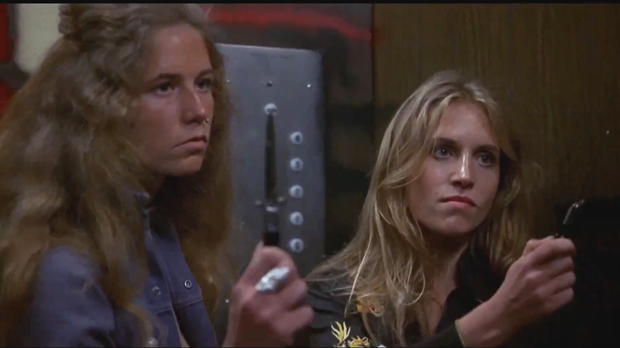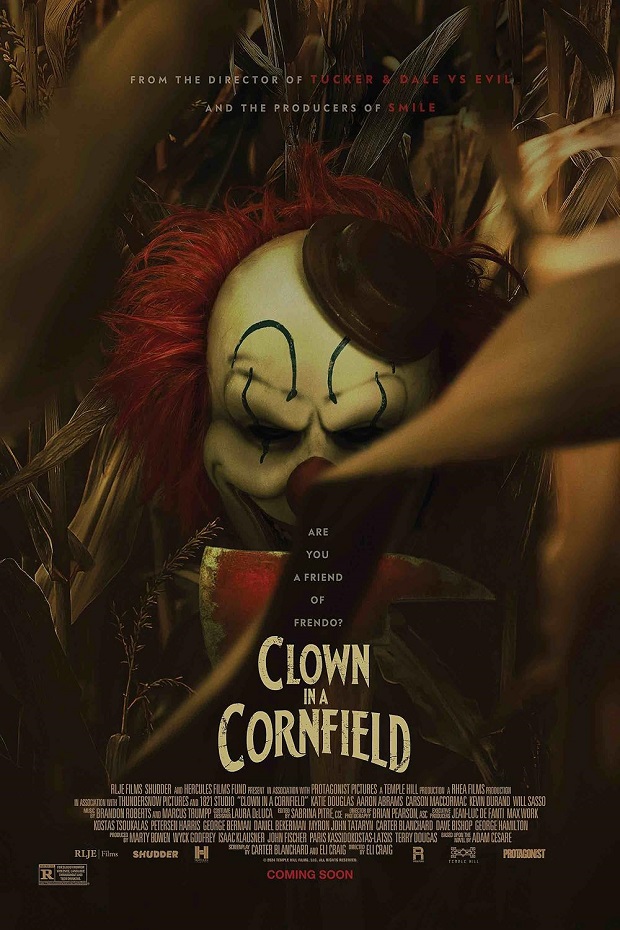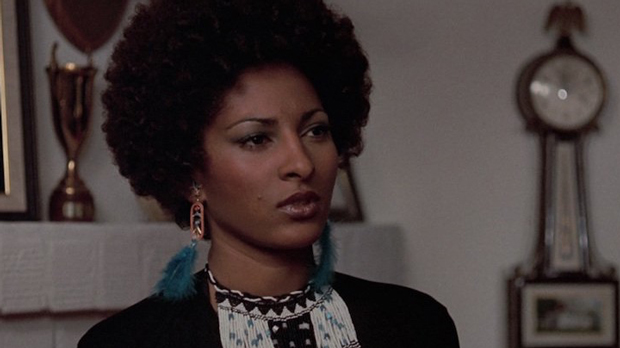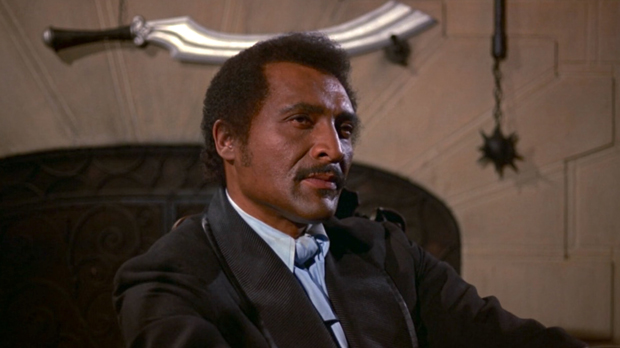 Switchblade Sisters (1975) Centaur Pictures/Action RT: 91 minutes Rated R (language, strong violence, nudity, sexual content, rape, drugs and alcohol) Director: Jack Hill Screenplay: F.X. Maier Music: Medusa Cinematography: Stephen Katz Release date: May 1, 1975 (US) Cast: Robbie Lee, Joanne Nail, Monica Gayle, Asher Brauner, Chase Newhart, Marlene Clark, Kitty Bruce, Janice Karman, Don Stark, Don Marino, Helene Nelson, Bill Adler, Paul Lichtman, J.S. Johnson, Kate Murtagh. Box Office: N/A AKA: The Jezebels and Maggie’s Stiletto Sisters
Switchblade Sisters (1975) Centaur Pictures/Action RT: 91 minutes Rated R (language, strong violence, nudity, sexual content, rape, drugs and alcohol) Director: Jack Hill Screenplay: F.X. Maier Music: Medusa Cinematography: Stephen Katz Release date: May 1, 1975 (US) Cast: Robbie Lee, Joanne Nail, Monica Gayle, Asher Brauner, Chase Newhart, Marlene Clark, Kitty Bruce, Janice Karman, Don Stark, Don Marino, Helene Nelson, Bill Adler, Paul Lichtman, J.S. Johnson, Kate Murtagh. Box Office: N/A AKA: The Jezebels and Maggie’s Stiletto Sisters
Rating: ****
It may be difficult to believe, but Switchblade Sisters almost plays like a Shakespearean tragedy with its themes of betrayal, power struggle and rivalry between sworn enemies. Those aren’t the kinds of things one expects to find in exploitation movies. No wonder it caught the attention of Quentin Tarantino who re-released it in ’96 under his Rolling Thunder label. As you probably already know, QT used to work at a video store where he spent countless hours watching trashy B-movies like Switchblade Sisters. If not for him, I never would have even heard of it.
Switchblade Sisters transcends the exploitation genre in many ways. In other ways, it’s firmly planted in its exploitation roots. Sure, the acting and dialogue are pretty bad and it’s full of clichés. It has a high sleaze factor too. At the same time, it’s smarter than the average gang drama. You can easily see the influences of the Bard throughout. Director Jack Hill (The Big Doll House) admits to being influenced by Shakespeare, Othello in particular. It all makes for a luridly entertaining movie.
Lace (Lee, Big Bad Mama) is the leader of the Dagger Debs, the girl gang that goes around with The Silver Daggers, the main street gang in that area of L. A. The Daggers control everything that goes down in the local high school, but things are about to change dramatically. Principal Weasel (Johnson, The Wild Party) has just informed leader Dominic (Brauner, Where the Boys Are ‘84) that a rival gang led by Crabs (Newhart) will be attending their school. He advises Dominic to hand over half of the high school to Crabs in order to avoid a full-fledged gang war.
Meanwhile, a new girl arrives on the scene. The Debs first encounter Maggie (Nail, The Visitor) at their favorite hang out, a local hamburger joint. A fight ensues and all the girls are taken to juvie hall where Maggie has a run-in with the sadistic lesbian warden Mom (Murtaugh, The Car). The Debs intervene, save Maggie and take her in as one of their own. Upon her release, she agrees to deliver a love letter for the still-incarcerated Lace to her boyfriend Dominic. He shows his gratitude by following Maggie home and raping her.
One-eyed Patch (Gayle, Nashville Girl), second-in-command and Lace’s closest friend, becomes jealous of Maggie and attempts to turn Lace against her. Meanwhile, the hostilities between the Daggers and their rivals escalate until they reach the boiling point with an unprovoked attack on Dominic’s brother. It results in a big fight at the local roller rink during which Dominic is killed. Maggie, standing in for seriously injured Lace, expels the guys after they refuse to take retaliatory action for their leader’s murder. Renaming the now-independent girl gang The Jezebels, she teams up with female black militants led by her old friend Muff (Clark, Slaughter) to take down Crabs and his boys.
I know, Switchblade Sisters is pure exploitation movie junk, but it’s actually smarter than most entries in the female street gang flick genre. I’d praise the screenwriter if I knew who he was. I have a hunch “F.X. Maier”* is a pseudonym. I couldn’t find any information about him anywhere on-line. It’s my theory Hill wrote the script, but didn’t want screen credit for it. It wouldn’t be the first time this happened. In any event, “Mr. Maier” does a good job of blending Shakespearean tragedy and gang action.
As I already mentioned, themes of betrayal and internal power struggle run throughout the movie. These are two components you’re more likely to find in a Shakespearean tragedy like Othello. The similarities between Switchblade Sisters and Othello are unmistakable. Patch is clearly the Iago character. Like the treacherous ensign long before her, she’s the catalyst for the series of tragic events that take place. As long as we’re headed down this path, it can be argued that Maggie is the Macbeth character with her desire for power. She won’t admit it openly, but she wants to take control of the gang. This, of course, will lead to a deadly duel between the two girls.
In transferring the action from the corridors of a royal castle to the mean streets of L.A., Hill does something original and quite brilliant. It helps a lot that the girls are hot. For those who care about such things, there’s some nudity, but not nearly as much as one would expect from a movie called Switchblade Sisters. However, there’s plenty of fighting. These chicks are tough and totally bad ass. You do not want to mess with them. In this respect, it could be said Switchblade Sisters is also a female empowerment movie. Think about it. All of the “heroic” characters are female while all the men are cowards, dopes and rapists. In its proper historical context- i.e. the mid-70s- it can be seen as an example of progress in the Women’s Liberation Movement. Why shouldn’t a bunch of tough females be allowed to fight a gang war? The idea of the girls fighting men makes any feminist agenda, intentional or not, clear and obvious.
What really cracks me up about this movie is how hopelessly dated Switchblade Sisters is. It features a gang of black militants with a political agenda and a cache of weapons? How 70s is that? Crabs and his gang supposedly run a youth center that offers at-risk teenagers a positive environment and hands out free breakfasts to the underprivileged children in the neighborhood. That kind of organization is long gone. The clothing, slang and cheesy music, it’s all the product of another time.
Although I’ve awarded Switchblade Sisters the highest rating possible, it’s not without flaws. For one thing, the acting is horrendous. The girls might look good in leather and chains, but all illusions are destroyed once they open their mouths. Not one line of dialogue is even remotely convincing. Everybody overacts like they’re trying to upstage each other in a high school play. However, it doesn’t really make that much of a difference. I don’t expect Hill cast anybody for their extraordinary thespian skills. It’s a pretty cool cast though. Lee and Nail are HOT! More seasoned exploitation movie fans will recognize Bill Adler from such drive-in classics as The Pom Pom Girls, The Van and Van Nuys Blvd. Kate Murtagh, who camps it up nicely, also played a heavy named “Mom” in the 1983 comedy Doctor Detroit.
Switchblade Sisters is a textbook example of a grindhouse movie, one normally found playing in disreputable theaters typically patronized by junkies, hookers, perverts and thugs. I was too young to see it during its initial run so I didn’t get the full experience of risking my life to watch a movie. I did get to see it at a city theater (with a decidedly tamer audience) when it came back in ’96. Hey, at least I got to see it on the big screen. That has to count for something, right?
Switchblade Sisters may be sleazy, but at least there are threads of culture to be found within it. Thank you very much, QT. Thank you for uncovering this fascinating cinematic relic and sharing it with the moviegoing public. As a bona fide movie geek, I LOVE this sort of thing. Watching obscure titles from the 70s- e.g. Rape Squad, Record City and Skatetown USA- fills me with a special kind of joy. Switchblade Sisters is its own kind of art. I guess you could call it trash art, but you know what they say about trash and treasure. For me, it’s definitely the latter.
*= In a chat with Jack Hill on FaceBook Messenger, he had this to say about F.X. Maier: “He’s a real person. F.X. of course is Francis Xavier (duh!). Dunno where he is today or if he’s still around. Nobody has asked me about him before. My producer at the time, the late John Prizer, dug him up.” Now we know.




